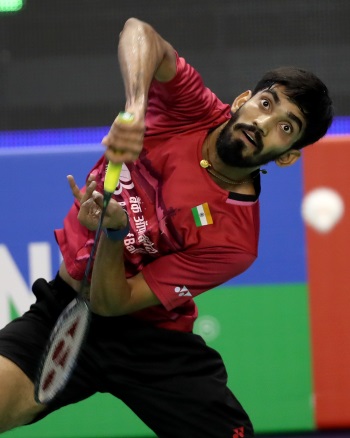Srikanth Kidambi not thinking about No.1
just wants to enjoy his badminton and playing well. Also wants to keep working on his fitness levels.
Srikanth still has to i
mprove his performance on slower conditions, he is good in fast conditions.
Link: http://bwfworldsuperseries.com/news...bi-tai-singles-finals-yonex-french-open-2017/
Excerpt:
FRENCH TOAST FOR KIDAMBI & TAI – SINGLES FINALS: YONEX FRENCH OPEN 2017
A fourth World Superseries crown this year for Kidambi Srikanth; ditto for Tai Tzu Ying. The most

successful Superseries singles winners this season completed their conquest of Paris in just over half-an-hour.
Japan’s Kenta Nishimoto and Akane Yamaguchi stood no chance against Kidambi and Tai in the Men’s Singles and Women’s Singles finals respectively at the Yonex French Open 2017.
Despite the similarity of the verdicts, there were differences aplenty in the details. Kidambi was all business from start to finish – the Indian kept his head down; a monk-like focus evident in his bearing.

He took some time to get going, but once he did, Nishimoto started to bleed points. The Indian’s accuracy was unerring – two points late in the match encapsulated the proceedings – the first, a down-the-line hammer blow, got him to 19-12; a cross-court smash found the same spot for match point. Minutes later he had his fourth Superseries crown from five finals this year – the 21-14 21-13 result continuing what has been a sensational year for the Indian.
“I’m just happy with the way it went the last couple of weeks,” said Kidambi. “I think he’s played really well this week. I felt it would be a tough match, but in the end I’m happy with the way I played. In the semis and quarters I started slow, but today I wanted to start well. He’s an aggressive player and I didn’t want to give him any chances.
“
I’m surprised with my fitness. The way we’ve been training the last ten months is doing its part now. I have to continue working like that.”
Asked if the
No.1 ranking was now on his mind, Kidambi said he wasn’t in the pursuit of points. “Definitely it would be good to get there, but I’m not thinking of it now. I don’t have points to defend, so I don’t want to push myself for (the sake of) rankings.
I just want to enjoy playing.”
Link 2: https://thefield.scroll.in/855909/h...s-loss-to-become-one-of-the-best-in-the-sport
Excerpt:
To understand how Srikanth has turned things around in the last three months, let’s go back to that
world championships defeat, where Srikanth
said he “tried almost everything and nothing worked.”
Playing under pressure
Srikanth had had a
slow start in that match against Son Wan Ho and by the time he found his groove after the interval in the second game, it was too late. Srikanth thrives on his aggressive game and likes to dictate terms. But if his
opponent managed to push him on the back-foot early on, he was finding it difficult to mount a comeback. It happened in Glasgow and it happened again in Tokyo.
At the Denmark Open last week, Srikanth again came up against Axelsen, who was playing on his home territory. The Dane went on to claim the first game rather easily, 21-14. It looked like there would be an encore all over again, with Srikanth seeming to have no answer to Axelsen’s power play.
However, that wasn’t to be. A switch inside Srikanth just flicked after that first game. He was a completely
different player in the second game.
He began to engage the Dane in longer rallies and started to play with patience, absorbing the pressure and waiting for his opponent to make a mistake.
Srikanth won the second game 22-20. The third and deciding game was not even a contest, as the Indian clinched it 21-7 and sent the world champion crashing out.
“I think it was important to play the right strategy and be alert in that match,” said India’s chief national coach and Srikanth’s mentor P Gopichand, when asked how his ward had turned things around. “Once he did that, things changed around in the second game.”
Arvind Bhat, one of India’s travelling coaches, said that the faster conditions of Denmark and France also played in Srikanth’s favour.
“Srikanth likes it when the shuttles are fast because he is a quick player,” Bhat said. “He can come to the net and kill, and he has good smashes. In fast conditions, Srikanth is definitely one of the best of the world.”
However, conditions alone cannot win you a crucial match. “What Srikanth is able to do now is keep cool in such pressure situations,” Bhat said. “I saw him very closely this time and I felt that he has grown in maturity as a player. He can play tough matches and be cool when under pressure.”
Srikanth’s coolness was visible in the quarter-finals of the French Open as well, when he was up against defending champion Shi Yuqi of China. Shi cruised through the first game 21-8, enough to set the alarm bells ringing.
However, Srikanth did not panic and again managed to turn things around. He won the second game 21-19, before again coasting along in the decider 21-9 to take the match.
Fitness transformation
One of the things
Srikanth has worked on in the last three months is to learn how to pace himself, according to Gopichand. This is especially important when competing in back-to-back tournaments like he did in Denmark and France, where he played 10 matches in 12 days. In such times, fitness is key.
“He has understood a few more things about his body in terms of how to recover well and prepare for the matches, and that’s what you see today,” Gopichand said.
Srikanth himself
admitted he was “surprised a little bit” that he had managed to pull off back-to-back Superseries title wins for the second time this year – after Australia and Indonesia – and credited his performance to “the way we have been training in the last nine to 10 months”.
Under Indonesian coach Mulyo Handoyo, who came on board in February this year, the Indian players have moved from shorter training sessions to longer ones, which helped them build their stamina.
Srikanth's increased fitness levels have been credited to Indonesian coach Mulyo Handoyo (third from left)
“There is a distinct change in his fitness levels after the Indonesian coach came in,” said Srikanth’s first coach, Sudhakar Reddy, who trained him before he joined the Gopichand academy in 2009, when he was 16.
“When Srikanth was with me, he was very lazy,” Reddy added. “He never used to do proper training, he never used to eat properly. Now he has started doing these things properly on his own.”
Work in progress
Despite Srikanth’s incredible run this year, both Gopichand and Bhat said he was still far from being a finished product. For one, he
still has to work on his slow-court game, where players who have a good defence and like to play long rallies will have an upper hand.
“
On slow courts, he will have to be far more patient and attack in the longer rallies,” said Bhat. “That’s when your fitness comes into play. He has to fight it out literally in the manner how Sindhu sticks in and plays in the long rallies. This is something he will have to work on.”
If Srikanth manages to do that, there’s no stopping him from becoming the best in the world.
Reddy believes Srikanth has already one-upped his mentor Gopichand.
“I don’t know if he can be compared with Prakash Padukone, but Srikanth is playing at a higher level than Gopi,” he said. “Gopi had only one All England title. When Prakash won the title, no one knew anything about badminton in India.”
What Reddy was trying to say is that Srikanth is in similar territory to the one Padukone found himself in during the 80s, doing what no other badminton player had done in India.
From winning the China Open in 2014 to bagging a record four Superseries titles in 2017, it’s unchartered territory for an Indian shuttler. An Olympic medal is perhaps the only milestone that still stands between Srikanth and the status of a legend. He’s got almost three years to work towards it.

 yet, downing sixth seeds Mads Conrad-Petersen and Mads Pieler Kolding last evening at the Yonex French Open 2017.
yet, downing sixth seeds Mads Conrad-Petersen and Mads Pieler Kolding last evening at the Yonex French Open 2017.
 yet, downing sixth seeds Mads Conrad-Petersen and Mads Pieler Kolding last evening at the Yonex French Open 2017.
yet, downing sixth seeds Mads Conrad-Petersen and Mads Pieler Kolding last evening at the Yonex French Open 2017.



